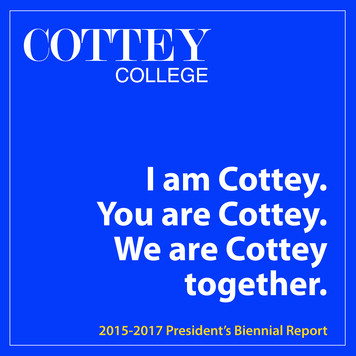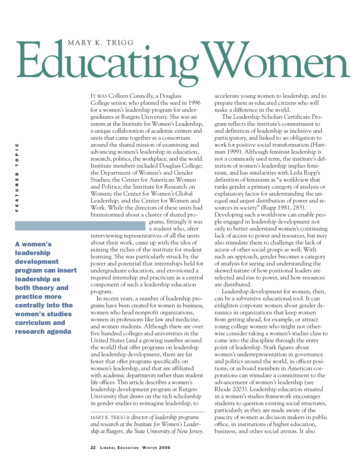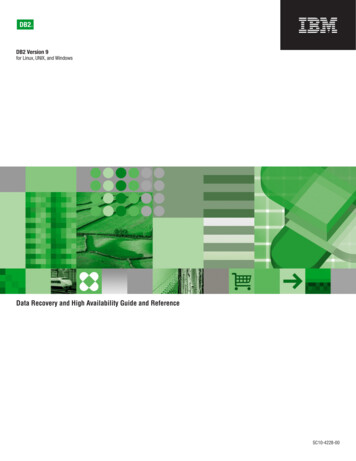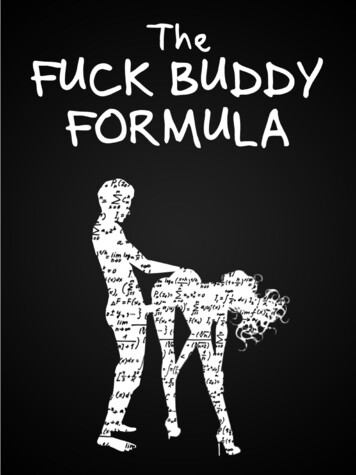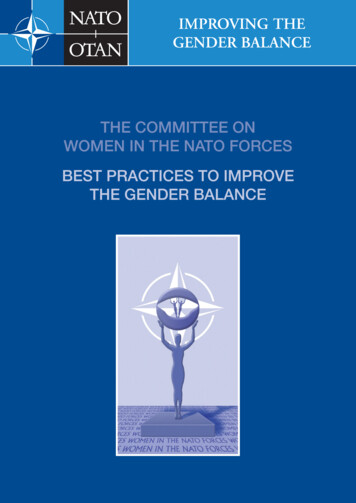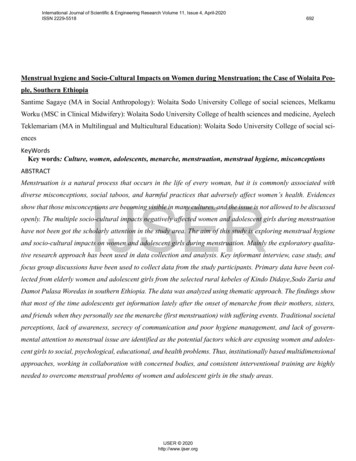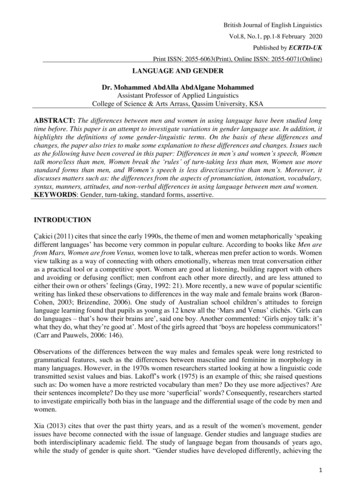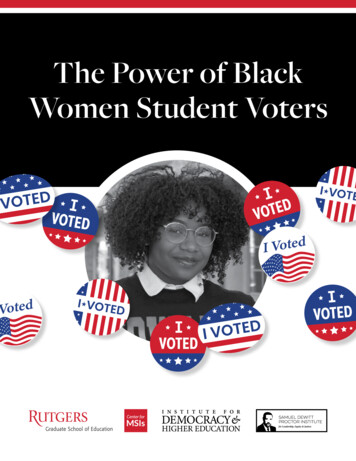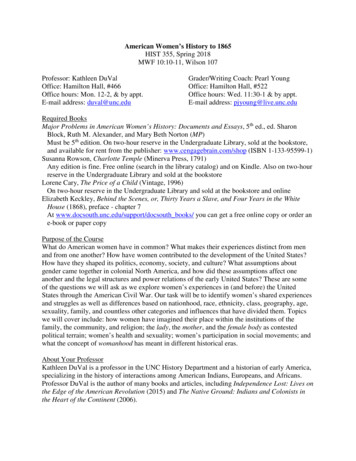
Transcription
American Women’s History to 1865HIST 355, Spring 2018MWF 10:10-11, Wilson 107Professor: Kathleen DuValOffice: Hamilton Hall, #466Office hours: Mon. 12-2, & by appt.E-mail address: duval@unc.eduGrader/Writing Coach: Pearl YoungOffice: Hamilton Hall, #522Office hours: Wed. 11:30-1 & by appt.E-mail address: pjyoung@live.unc.eduRequired BooksMajor Problems in American Women’s History: Documents and Essays, 5th ed., ed. SharonBlock, Ruth M. Alexander, and Mary Beth Norton (MP)Must be 5th edition. On two-hour reserve in the Undergraduate Library, sold at the bookstore,and available for rent from the publisher: www.cengagebrain.com/shop (ISBN 1-133-95599-1)Susanna Rowson, Charlotte Temple (Minerva Press, 1791)Any edition is fine. Free online (search in the library catalog) and on Kindle. Also on two-hourreserve in the Undergraduate Library and sold at the bookstoreLorene Cary, The Price of a Child (Vintage, 1996)On two-hour reserve in the Undergraduate Library and sold at the bookstore and onlineElizabeth Keckley, Behind the Scenes, or, Thirty Years a Slave, and Four Years in the WhiteHouse (1868), preface - chapter 7At www.docsouth.unc.edu/support/docsouth books/ you can get a free online copy or order ane-book or paper copyPurpose of the CourseWhat do American women have in common? What makes their experiences distinct from menand from one another? How have women contributed to the development of the United States?How have they shaped its politics, economy, society, and culture? What assumptions aboutgender came together in colonial North America, and how did these assumptions affect oneanother and the legal structures and power relations of the early United States? These are someof the questions we will ask as we explore women’s experiences in (and before) the UnitedStates through the American Civil War. Our task will be to identify women’s shared experiencesand struggles as well as differences based on nationhood, race, ethnicity, class, geography, age,sexuality, family, and countless other categories and influences that have divided them. Topicswe will cover include: how women have imagined their place within the institutions of thefamily, the community, and religion; the lady, the mother, and the female body as contestedpolitical terrain; women’s health and sexuality; women’s participation in social movements; andwhat the concept of womanhood has meant in different historical eras.About Your ProfessorKathleen DuVal is a professor in the UNC History Department and a historian of early America,specializing in the history of interactions among American Indians, Europeans, and Africans.Professor DuVal is the author of many books and articles, including Independence Lost: Lives onthe Edge of the American Revolution (2015) and The Native Ground: Indians and Colonists inthe Heart of the Continent (2006).
AssignmentsClass Attendance: We will take attendance in class. You may have up to two unexcused absenceswithout penalty. Attendance will count for 10% of your grade.In-Class Participation: We will have discussions in class every day, with full-period discussionssome days (usually Fridays). If the Class Schedule lists a reading assignment for a particular day,come to class that day having completed the reading and being prepared to discuss it. If you dothe reading and participate actively and constructively in the discussions throughout the term,you will receive a good participation grade. If you have difficulty speaking in class, please seeMs. Young or Prof. DuVal to discuss how you can participate more. We will explain in classhow to record your attendance and participation. Participation will count for 10% of your grade.Paragraphs: When the syllabus lists a Paragraph Question for your group, at the beginning ofthat class turn in one typed, double-spaced paragraph of 150 to 200 words (approx. 1/2 page)answering the question. Because one of the goals of the class is to improve your writing, yourgrade will reflect the quality of the writing as well as the thoughtfulness of your answer to thequestion. The first sentence of the paragraph should be a strong thesis statement that answers thequestion. The following sentences should support that thesis. Include examples from thereadings, explain how they support your answer, and cite any sources with footnotes. The finalsentence should sum up the paragraph. We will not accept late, un-typed, or inordinately short orlong paragraphs. There will be a rewrite assignment for the first paragraph. The average of yoursix paragraphs (including the rewrite) will count for 25% of your grade.Reading Quizzes: Periodically throughout the semester, there will be reading quizzes onSakai. These will be basic, factual questions. The quizzes will be open-book and open-note buttimed, so do the reading before starting the quiz. Your best five quiz grades will count. Therewill be no make-up quizzes. The quizzes will count for 15% of your grade.Paper: For this paper, choose one memoir from the following list and write a paper ofapproximately 1,500 to 2,000 words (5-6 double-spaced pages). WARNING: This paper shouldnot simply discuss the memoir but should make and defend an argument. It should includequotations from and citations to the memoir. During the first few weeks of class, you will sign upfor a memoir. (Each student will read all three but write on only one.) The paper will count for20% of your grade.1. Mary Jemison, Life of Mary Jemison (1824), excerpts (on Sakai)2. Abigail Bailey, Memoirs of Mrs. Abigail Bailey: Who Had Been the Wife of Major Asa Bailey(late eighteenth century), biography and diary entries (on Sakai)3. Elizabeth Keckley, Behind the Scenes, or, Thirty Years a Slave, and Four Years in the WhiteHouse (1868), preface - chapter 7 (see p. 1 of the syllabus to access)Final Exam: The final will have three parts and be cumulative. The first part will focus on aprimary source that we read for class. The second part will ask you to interpret a new documentin terms of major themes we’ve discussed in class. The third part will be an essay question on amajor theme of the class. The final will count for 20% of your grade.2
Class ScheduleWed., Jan. 10Introduction to American Women’s HistoryFri., Jan. 12DiscussionReading: Alice Kessler-Harris, “Do We Still Need Women’s History?,” Chronicle of HigherEducation 54 (2007), p. e/Do-We-Still-Need-Womens/4897/Bawdy Humor on Marriage, 1730s & 1777 (MP 88)Assignment: From the news or social media, bring in one recent example of humor that usesgender (could be a cartoon, meme, true or fake news story, opinion piece, etc.)Mon., Jan. 15No class—UNC HolidayWed., Jan. 17American Women before 1492Fri., Jan. 19DiscussionReading: Great Law of the Iroquois League, c. 1300s (on Sakai)Samuel de Champlain, 1616 (MP 25-26)Gerónimo Boscana, 1832 (MP 262-9)Nancy Shoemaker, “Kateri Tekakwitha: Native Women and Christianity” (MP 35-41)Paragraph Question for Group A: Choose a major point of Shoemaker’s essay, put it in your ownwords in your paragraph’s topic sentence (“Historian Nancy Shoemaker argues that ”), and usethe rest of the paragraph to explain how she supports that point.Sixteenth-Century French engraving of American Indian farmersMon., Jan. 22Women in Western Europe and West AfricaWed., Jan. 24Meeting the Men Who Have No WomenFri., Jan. 26DiscussionReading: Judith Carney, “African Women’s Influence on Rice Cultivation” (MP 73-76)Jennifer Morgan, “‘Some Could Suckle over Their Shoulder’: Male Travelers,Female Bodies, and the Gendering of Racial Ideology, 1500-1770,” William &Mary Quarterly 54 (Jan. 1997), 167-92 (JSTOR)3
Paragraph Question for Group B: Choose a major point of Morgan’s essay, put it in your ownwords in your paragraph’s topic sentence (“Historian Jennifer Morgan argues that ”), and usethe rest of the paragraph to explain how she supports that point.Mon., Jan. 29Colonial Women, Part IRewrite due for Group A.Wed., Jan. 31Colonial Women, Part IIFri., Feb. 2DiscussionReading: Cotton Mather, A Family Well-Ordered, excerpts (on Sakai)Esther Burr, 1750s (on Sakai)Documents on the Salem Witch Trials (on Sakai)Paragraph Question for Group A: Choose one thing that the documents tell us about women incolonial New England and defend your assertion with references to the document(s).Mon., Feb. 5Native American Women and ColonialismRewrite due for Group B.Mon., Feb. 5, 5-7 p.m.: Required Film, The Witch (MGM, 2015), room TBA(alternative non-horror film choice: The Crucible (any version))Wed., Feb. 7Colonial SlaveryFri., Feb. 9DiscussionReading: Apprenticeships, circa 1700 (MP 59)Elizabeth Sandwith Drinker, 1758-1780 (MP 61-62)Chart of Huron Indians’ Labor (MP 62)Mary Prince, 1831 (MP 62-3)Virginia Bouvier, “Women’s Work in California’s Spanish Missions” (MP 76-80)Paragraph Question for Group B: Choose 1-2 of the primary sources (not the Bouvier essay) tomake an argument about women’s work (for a specific woman, a particular kind of women, orfor all women of the era).4
Mon., Feb. 12Property and Status Across North AmericaWed., Feb. 14A Midwife’s Tale (Laurie Kahn-Leavitt, 1998)Fri., Feb. 16DiscussionReading: Cornelia Hughes Dayton, “Abortion and Gender Relations in Eighteenth-CenturyNew England” (MP 90-98)Kathleen DuVal, “Indians’ Marital and Intercultural Relationships in ColonialLouisiana” (MP 98-108)Paragraph Question for Group A: Put Cornelia Hughes Dayton’s argument in your own wordsand briefly explain how she supports it.Daughter of Liberty, 1774 woodcutMon., Feb. 19Women and the American RevolutionReading: Mary Phillips, 1777 (MP 116)Mon., Feb. 19, 5-7 p.m.: Required Film, Mary Silliman’s War (1994), room TBAWed., Feb. 21Citizenship and EducationReading: Abigail Adams, John Adams, and Mercy Otis Warren, 1776 (MP 113-5)Petition of Belinda, 1787 (MP 117-8)Fri., Feb. 23DiscussionReading: Susanna Rowson, Charlotte TempleParagraph Question for Group B: What is one important thing we learn about late eighteenthcentury women’s history by reading Charlotte Temple?Mon., Feb. 26American Indian Women in a Changing WorldReading: Seneca Women, 1791 (MP 115-116)Wed., Feb. 28Discussion of Mary Jemison (all students)Reading: Mary Jemison, Life of Mary Jemison (1824), excerpts (on Sakai)Paragraph Question for Students Writing Jemison Papers: Draft an introductory paragraph foryour paper. Underline the argument statement.5
Fri., Mar. 2Workshop for People Writing on Mary JemisonOptional: Campus Tour “Digging in Our Heels, Angels on Campus: The Herstory of Women atCarolina,” Fri., Mar. 2, starting at 3 p.m. at the UNC Visitors’ Center. To reserve a space, emailuncvisitorscenter@unc.edu.Mon., Mar. 5Nineteenth-Century ReligionReading: Declaration of Sentiments, 1848 (MP 141-143)**Paper due for those writing on Jemison**Wed., Mar. 7Transformations and Continuities in Women’s WorkFri., Mar. 9 through Fri., Mar. 16 Spring Break—No Class**start reading Lorene Cary novel**Mon., Mar. 19The Working Class and the Middle ClassReading: Keep within the Compass (MP 134)Wed., Mar. 21Discussion of Abigail Bailey (all students)Reading: Abigail Bailey, Memoirs of Mrs. Abigail Bailey: Who Had Been the Wife of MajorAsa Bailey (late eighteenth century), biography and diary entries (on Sakai)Paragraph Question for Students Writing Bailey Papers: Draft an introductory paragraph for yourpaper. Underline the argument statement.Fri., Mar. 23Workshop for People Writing on Abigail BaileyOptional: Campus Tour “Digging in Our Heels, Angels on Campus: The Herstory of Women atCarolina,” Fri., Mar. 23, starting at 3 p.m. at the UNC Visitors’ Center. To reserve a space, emailuncvisitorscenter@unc.edu.1862 photograph, Library of CongressMon., Mar. 26Southern Women and Plantation Slavery**Paper due for those writing on Bailey**Reading: Harriet Jacobs, 1861 (MP 164-166)6
Wed., Mar. 28Discussion of Lorene Cary, The Price of a ChildReading: Lorene Cary, The Price of a ChildParagraph Question for Both Groups: What is one important thing we learn about earlynineteenth-century women’s history by reading The Price of a Child?Fri., Mar. 30No Class—UNC HolidayJohn Gast, American Progress, 1872Mon., Apr. 2The West before American ExpansionReading: Eulalia Callis Petition, 1780s (MP 135-137)Wed. Apr. 4Moving WestFri., Apr. 6No Class (to make up for film)Mon., Apr. 9Reform MovementsReading: American Female Moral Reform Society, 1839 (MP 137-138)Anti-Slavery Convention, 1837 (MP 138-141)Abolitionist image7
Wed., Apr. 11Discussion of Elizabeth Keckley (all students)Reading: Elizabeth Keckley, Behind the Scenes, or, Thirty Years a Slave, and Four Years in theWhite House (1868), preface - chapter 7 (see p. 1 of the syllabus to access)Paragraph Question for Students Writing Keckley Papers: Draft an introductory paragraph foryour paper. Underline the argument statement.Fri., Apr. 13Workshop for People Writing on Elizabeth KeckleyMon., Apr. 16Women and the Civil War, The North**Paper due for those writing on Keckley**Reading: Cornelia Hancock, 1863 (MP 203-204)Wed., Apr. 18Women and the Civil War, The SouthReading: Sarah Morgan, 1863 (MP 202-203)Ella Gertrude Clanton Thomas, 1865 (MP 205)Civil War photograph, Library of CongressFri., Apr. 20No Class (to make up for film)Mon., Apr. 23Telling Women’s Stories in a World (Mostly) Run By MenReading: Estelle B. Freedman, “A Personal History of Women’s History” (MP 2-8)Vicki L. Ruiz & Leisa D. Meyer, “‘Ongoing Missionary Labor’: A Conversation onChicana Studies/History” (MP 8-12)Mia Bay, “Black Women Historians and Black Women’s History” (MP 12-18)Assignment: Bring in a news story that connects women’s history to women in the present.Mon., Apr. 23, 5-7 p.m.: Required Film, The Beguiled (2017), room TBA(alternative film choice: Cold Mountain (2003))Wed., Apr. 25Conclusions & ReviewFri., Apr. 27No Class (to make up for film—but do come see us in office hours!)**FINAL EXAM: 8-10 a.m., Monday, Apr. 30, in our regular classroom**8
Grading Scale93 A90-92 A87-89 B 83-86 B80-82 B77-79 C 73-76 C70-72 C67-69 D 63-66 D60-62 D0-59 FPlease note that the instructor reserves to right to make changes to the syllabus when unforeseencircumstances occur. These changes will be announced as early as possible so that studentscan adjust their schedules.On every assignment that you turn in, please write the following and sign:On my honor, I have neither given nor received unauthorized aid on this assignment.Honor CodeFrom The Instrument of Student Judicial Governance,Section IIB. Academic DishonestyIt shall be the responsibility of every student enrolled at the University of North Carolina tosupport the principles of academic integrity and to refrain from all forms of academic dishonesty,including, but not limited to, the following:1. Plagiarism in the form of deliberate or reckless representation of another’s words, thoughts,or ideas as one’s own without attribution in connection with submission of academic work,whether graded or otherwise.2. Falsification, fabrication, or misrepresentation of data, other information, or citations inconnection with an academic assignment, whether graded or otherwise.3. Unauthorized assistance or unauthorized collaboration in connection with academic work,whether graded or otherwise.4. Cheating on examinations or other academic assignments, whether graded or otherwise,including but not limited to the following: a. Using unauthorized materials and methods (notes,books, electronic information, telephonic or other forms of electronic communication, or other9
sources or methods); b. Violating or subverting requirements governing administration ofexaminations or other academic assignments; c. Compromising the security of examinations oracademic assignments; d. Representing another’s work as one’s own; or e. Engaging in otheractions that compromise the integrity of the grading or evaluation process.5. Deliberately furnishing false information to members of the University community inconnection with their efforts to prevent, investigate, or enforce University requirementsregarding academic dishonesty.6. Forging, falsifying, or misusing University documents, records, identification cards,computers, or other resources so as to violate requirements regarding academic dishonesty.7. Violating other University policies that are designed to assure that academic work conformsto requirements relating to academic integrity.8. Assisting or aiding another to engage in acts of academic dishonesty prohibited by SectionII. B.Please see Sakai for other helpful documents.10
2. Abigail Bailey, Memoirs of Mrs. Abigail Bailey: Who Had Been the Wife of Major Asa Bailey (late eighteenth century), biography and diary entries (on Sakai) 3. Elizabeth Keckley, Behind the Scenes, or, Thirty Years a Slave, and Four Years in the White House (1868),


